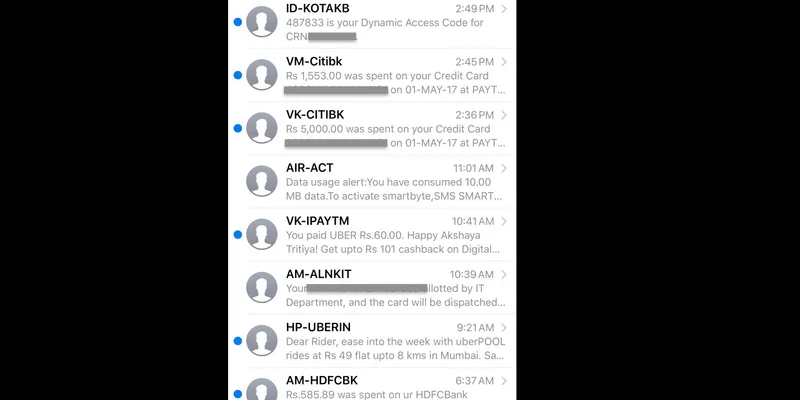

Will our dependency on SMS end?
A rant on sms overload mixed with rationale
For all practical purpose over the last five years, chatting on a smartphone has moved from SMS to an IP connection. You sure have seen this chart below — WhatsApp’s growth in recent years. Add to that the Facebook Messenger, Google Hangouts, Instagram & Twitter DMs etc which has taken a lot of our last decades worth of SMS usage away. However, how many of us would be comfortable to bury the SMS app somewhere deep within unseen folders of our smartphone and turn off all notifications for the same?

Image source: Economist
Every other day a bank login or transaction requires an OTP which is generally delivered via SMS. Trying to enter certain corporate offices, logging in to Paytm or filing GST returns in India requires an OTP¹. And that is not all. The moment any of these service providers have my mobile number, the barrage of SMSs keep following. Be it from an e-commerce site whom I transacted with over a year ago, be it an airline who got my phone number from the travel agent or even the government who wants to caution me about something.
For most practical purposes, DND doesn’t work. I have tried religiously reporting SMS spam to my service provider and the barrage has never slowed, let alone stop entirely. If I am to break down the frustration of dealing with SMS into three parts, here is the situation:
a) There are OTPs that are important. I need them. I just wish I didn’t have to open the SMS app just for reading OTPs. But if that’s all which comes through an SMS, I may be fine, I could just glance through the OTP in the notification and be done with it. There are also transaction notifications that come through, which are often unnecessary. Let me explain. Upon making a PhonePe transaction, I get one notification from PhonePe app, one SMS from PhonePe and one SMS from my Bank for the credit or debit — that’s too many notifications for one transaction.
I just wish if all notifications could be switched to app notifications instead of SMS or I am given a trigger to easily choose which one I prefer within the app settings. I can also imagine SMS is probably the most reliable medium since it works without mobile data too. So, an ideal solution would be if SMS was a fall-back option, in case a push notification fails to reach.

SMSes - All in a days time!
b) There is of course the importance of phone no. in our our country. Several e-commerce sites won’t let you proceed with a transaction without a 10 digit mobile number. Give them your primary number and you run the risk of getting all sorts of promotional messages from them for years to come. Give them a secondary number (which you may not always have on you) and there’s a chance the courier service can’t reach you when the delivery runs into trouble.
A lot of times without any mechanism by them to even track if those SMSs are effective. At least a tracking URL would give them some insights on CTR, even if open rates like in case of email marketing are absent on SMS. I would give some benefit of doubt to the poor marketers spamming on SMS that they don’t even have an inherent mechanism allowing users to unsubscribe².
c) To help ourselves free from SMS spam, Android users can take help of messaging apps like Truecaller or Microsoft’s SMS Organizer to help filter the good SMSs from the bad. But the biggest a-hole move is when transactional and promotional messages come from the same sender ID! This way, you can’t even afford to mark a sender that send you an offer about a new credit card scheme as spam, because that’s the same conversation you receive all your existing credit card OTPs in.
E-commerce sites with their app installed on the user’s phone have gradually learnt to send notifications instead of SMS. But every once in awhile a smart marketer sees the need to double down with a SMS campaign, because most users won’t be able to block them.
This situation leads to a much needed move by WhatsApp or its competitors (Hike?) to allow opt-in transactional messages with unsubscribe & block option to service providers. Not only can it be cheaper to send compared to SMS, it also allows better interface and management to the user. We probably are pushed to this desperation of (thinking about) relying on a third party app instead of a open box like SMS due to constant abuse & the failure of DND (which was always hard to implement). There may still be some good ways to improve DND, but that’s a subject for another debate some other day.
The counter argument to this would of course be the fact that we are expecting institutions and corporations to rely on a third party service like WhatsApp, which can much more easily take the gold mine of data in these SMSs to optimise ads you see on Facebook. Users may not care, but internet companies who know the value of data would. This leads me to think, will our dependency on SMS ever end? A citizen is today more tightly tied to his/her mobile number than 5 years back. And the grip only seems to be increasing.
¹ Before you tell me on Android most of the OTP SMS’s are read automatically, I would remind you that desktop still exists. iPhone too. And some people like me who are vary of giving SMS reading access to any 3rd party apps. There are some OTPs that also arrive by email, that is welcome, but the dependency on OTP is ever increasing, if you saw the tax filing example!
² Though instead of a shot in the dark to millions of subscribers, I would advise marketers to spend a little space once in awhile to add a URL that unsubscribes the user. Sending SMS is far more expensive than emails, it makes sense to optimise. Or have a URL as CTA and build a system to ignore users who have never acted on the CTA.
Annkur is the co-founder of Pricebaba, a product research engine for India. With contributions from Rohan Naravane.






